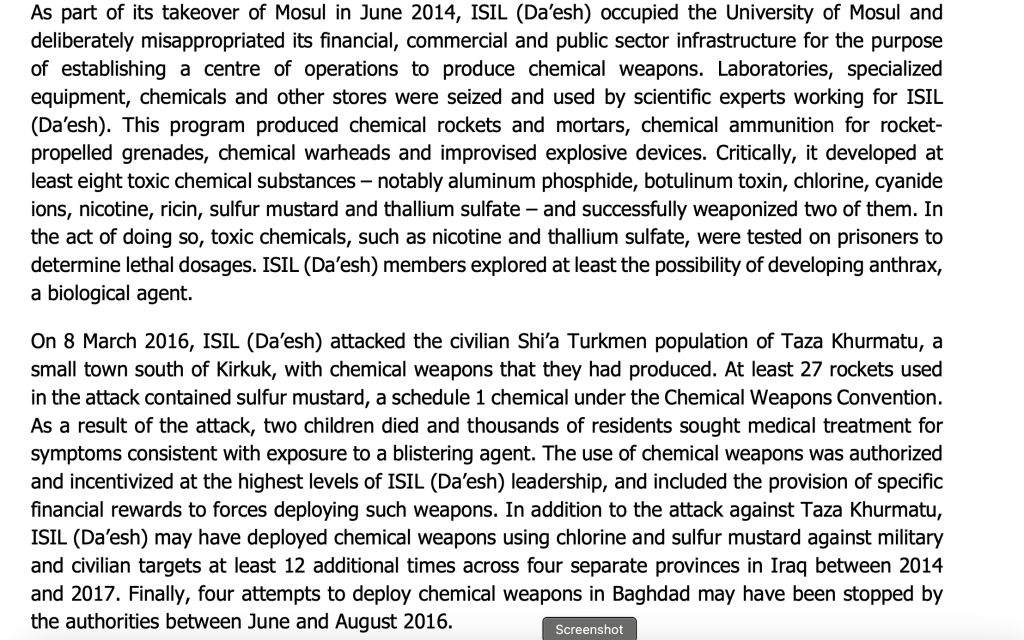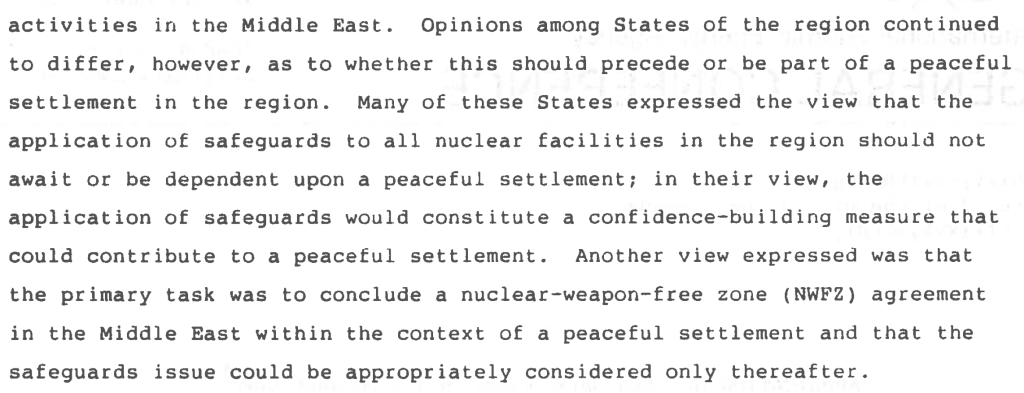I recently ran across this Unitad fact sheet titled ISIL (Da’esh) Chemical and Biological Weapons Program in Iraq.
Here’s the Overview of Factual Findings:

I’ve never understood why this issue hasn’t received more attention.

I recently ran across this Unitad fact sheet titled ISIL (Da’esh) Chemical and Biological Weapons Program in Iraq.
Here’s the Overview of Factual Findings:

I’ve never understood why this issue hasn’t received more attention.
From this interview:
We didn’t know about October 7th. Actually, we were supposed to have a meeting with the Americans on JCPOA renewal on October 9th, which was undermined and destroyed by this operation.
AEOI head Mohammad Eslami dropped some numbers related to Iran’s heavy water program:
He said the main reason for the West’s irritation is the huge economic potential that exists in Iran’s heavy water production, adding that the country can fetch thousands of dollars for each gram of by-products obtained from heavy water production.“
Each (metric) ton of methanol produced from heavy water is worth $1.2 million while the price of the methanol produced in petrochemical plants is less than $500 (per ton),” the AEOI chief continued.
Eslami said that Western countries, including the US, have admitted that the heavy water produced in Iran has the highest degree of purity in the world.
He added that Iran can increase its share of the global heavy water market from the current 12.5% if it decides to sell the by-products produced in the sector.
I can’t validate these claims, of course, but I found them interesting.
From the. January 16 MFA briefing:
Yonhap News Agency: The incoming US Secretary of Defense Pete Hegseth at his confirmation hearing referred to the DPRK as a nuclear power. The governments of the ROK, US and Japan reiterated that they do not recognize the status of the DPRK as a nuclear-armed state, and their denuclearization policy on the DPRK remains unchanged. How does China view Hegseth’s remarks?
Guo Jiakun: China’s basic position on the Korean Peninsula issue remains unchanged. We believe that keeping the Peninsula peaceful and stable, and advancing the political settlement of the Peninsula issue serve the common interests of all parties, and hope that all parties will make an effort to this end.
From the January 15 MFA briefing:
RIA Novosti: Seventy years ago today, the Chinese government decided to develop its own nuclear weapons. China today is one of the nuclear powers, and in recent years, the US has repeatedly claimed that China is increasing its nuclear arsenal. Donald Trump previously said that China would match or even surpass the US in terms of nuclear arsenal. What’s the Foreign Ministry’s comment on this?
Guo Jiakun: As a responsible major country, China is committed to the path of peaceful development and friendly cooperation with all countries in the world. The development of nuclear weapons was a historic choice that China had to make during an extraordinary times to respond to nuclear threat, end nuclear monopoly, and prevent a nuclear war. China follows a policy of “no first use” of nuclear weapons and a nuclear strategy that focuses on self-defense. China always keeps its nuclear strength at the minimum level required by national security, and never engages in arms race with anyone.
On January 3, Ambassador Zamir Akram, Pakistan’s PermRep to the UN, articulated some thoughts about recent US sanctions on Pakistani entities contributing to the country’s long range ballistic missile program.
Ambassador Zamir Akram stated that the U.S. sanctions go back a long time. When India conducted a nuclear test in 1974, the U.S. imposed sanctions on Pakistan to prevent it from developing its nuclear programme. Pakistan-specific sanctions were also imposed after the 1998 Indian nuclear tests. He underscored that there has always been U.S. discriminatory treatment against Pakistan vis-à-vis nuclear and missile programs. Ambassador Akram also noted that the strategic partnership between Pakistan and China may have been a factor in shaping U.S. policy, including the decision to impose sanctions on Pakistan. The pressure on Pakistan was also part of the strategy to contain China. He argued that Pakistan cannot cap its missile capabilities. In addition, he emphasized the need to develop its missile program to counter the threat from India, and underscored the need to develop a robust space program. Ambassador Akram concluded by noting that the impact of these sanctions has been relatively limited, pointing out that Pakistan’s missile program is indigenous, a development that has been driven, in part, by the country’s proactive response to previous U.S. sanctions.
Somewhat old news, but a gentleman named Takeshi Ebisawa pleaded guilty “to conspiring with a network of associates to traffic nuclear materials, including uranium and weapons-grade plutonium, from Burma to other countries.” According to the superseding indictment


This 1992 IAEA report outlines some interesting verification options for a MENWFZ. Showing that certain issues never go away, the report also contains this paragraph:

Late to the party, but I thought it was worth noting this State Dept sanctions notice which has some useful details about Pakistan’s missile program:
Belarus-based Minsk Wheel Tractor Plant has worked to supply special vehicle chassis to Pakistan’s long-range ballistic missile program. Such chassis are used as launch support equipment for ballistic missiles by Pakistan’s National Development Complex (NDC), which is responsible for the development of Missile Technology Control Regime Category (MTCR) I ballistic missiles.
PRC-based Tianjin Creative Source International Trade Co Ltd has supplied missile-related equipment to Pakistan’s long-range ballistic missile program, including stir welding equipment (which the United States assesses can be used to manufacture propellant tanks used in space launch vehicles), and a linear accelerator system (which the United States assesses can be used in the inspection of solid rocket motors). Tianjin Creative’s procurements were likely destined for Pakistan’s Space and Upper Atmosphere Research Commission (SUPARCO), which develops and produces Pakistan’s MTCR Category I ballistic missiles.
A November 1 Commerce FR notice has a good summary of Russian CW use in Ukraine, as well as the broader RCA issue:
The U.S. Department of Commerce is expanding controls under the EAR to include certain chemical precursors that are essential for the ‘‘production’’ of chemical riot control agents (RCAs) and chloropicrin that Russia has deployed against Ukraine in violation of the Chemical Weapons Convention (CWC). These new regulatory restrictions, which are specific to Russia and Belarus, aim to limit the use of these chemical precursors in the context of the war in Ukraine